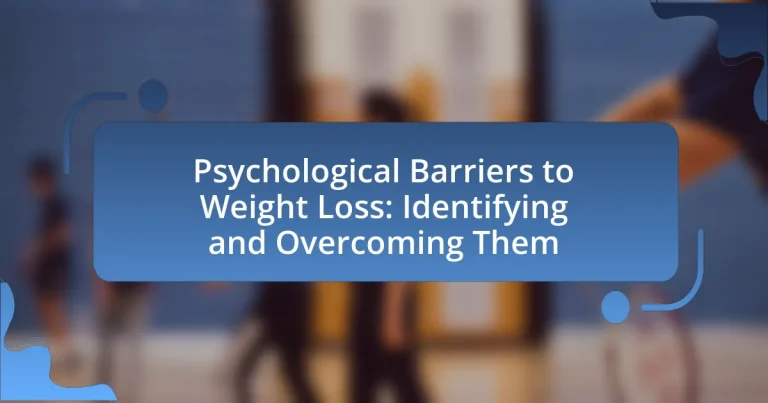Psychological barriers to weight loss encompass negative self-perception, emotional eating, and lack of motivation, which significantly hinder individuals’ weight management efforts. This article explores how these psychological factors influence eating behaviors and motivation, highlighting common barriers such as fear of failure and stress. It emphasizes the importance of identifying these barriers and discusses effective strategies for overcoming them, including cognitive-behavioral therapy, mindfulness practices, and the role of support systems. By addressing these psychological challenges, individuals can enhance their weight loss outcomes and maintain healthier lifestyles.

What are Psychological Barriers to Weight Loss?
Psychological barriers to weight loss include negative self-perception, emotional eating, and lack of motivation. Negative self-perception can lead to feelings of inadequacy, making individuals less likely to pursue weight loss goals. Emotional eating often occurs as a coping mechanism for stress or anxiety, resulting in overeating and hindering weight loss efforts. Additionally, a lack of motivation can stem from unrealistic expectations or previous failures, causing individuals to abandon their weight loss journey. Research indicates that addressing these psychological factors is crucial for successful weight management, as they significantly influence behavior and decision-making related to diet and exercise.
How do psychological factors influence weight loss efforts?
Psychological factors significantly influence weight loss efforts by affecting motivation, behavior, and emotional responses to food. For instance, individuals with high levels of stress or anxiety may engage in emotional eating, which can hinder weight loss progress. Research indicates that cognitive-behavioral strategies, such as goal setting and self-monitoring, can enhance motivation and adherence to weight loss plans. A study published in the journal “Obesity” by Van Strien (2018) found that psychological interventions improved weight loss outcomes by addressing emotional triggers and reinforcing positive behaviors. Thus, understanding and addressing these psychological factors is crucial for effective weight management.
What specific psychological barriers are commonly encountered?
Common psychological barriers encountered in weight loss include emotional eating, lack of motivation, negative self-talk, and fear of failure. Emotional eating occurs when individuals consume food in response to feelings rather than hunger, often triggered by stress or sadness. Lack of motivation can stem from unrealistic expectations or previous unsuccessful attempts at weight loss, leading to a sense of hopelessness. Negative self-talk undermines confidence and can create a self-fulfilling prophecy of failure. Fear of failure prevents individuals from committing to a weight loss plan, as they may worry about not achieving their goals. These barriers are supported by research indicating that psychological factors significantly influence eating behaviors and weight management outcomes.
How do emotions impact eating behaviors and weight loss?
Emotions significantly impact eating behaviors and weight loss by influencing food choices and consumption patterns. For instance, individuals often engage in emotional eating, where they consume food in response to feelings such as stress, sadness, or boredom, rather than hunger. Research indicates that emotional eating can lead to increased calorie intake and weight gain, as evidenced by a study published in the journal “Appetite,” which found that individuals with higher emotional distress reported greater food consumption and preference for high-calorie foods. Furthermore, negative emotions can trigger cravings for comfort foods, which are typically high in sugar and fat, further complicating weight loss efforts. Thus, the interplay between emotions and eating behaviors is a critical factor in understanding and addressing psychological barriers to weight loss.
Why is it important to identify psychological barriers?
Identifying psychological barriers is crucial because it enables individuals to understand the mental obstacles that hinder their weight loss efforts. Recognizing these barriers, such as fear of failure or negative self-image, allows for targeted strategies to address them, ultimately facilitating more effective weight management. Research indicates that psychological factors significantly influence eating behaviors and motivation; for instance, a study published in the journal “Obesity” found that cognitive-behavioral interventions that address psychological barriers lead to greater weight loss success compared to standard approaches.
What role does self-awareness play in overcoming these barriers?
Self-awareness plays a crucial role in overcoming psychological barriers to weight loss by enabling individuals to recognize their thoughts, emotions, and behaviors that contribute to unhealthy habits. This recognition allows individuals to identify triggers for overeating or inactivity, facilitating the development of strategies to address these issues. Research indicates that self-awareness can lead to improved emotional regulation and decision-making, which are essential for maintaining a healthy lifestyle. For instance, a study published in the journal “Health Psychology” found that individuals with higher self-awareness were more likely to engage in positive health behaviors and less likely to succumb to negative emotional eating patterns.
How can understanding these barriers lead to more effective weight loss strategies?
Understanding psychological barriers to weight loss enables the development of tailored strategies that address individual challenges, leading to more effective outcomes. By identifying specific barriers such as emotional eating, lack of motivation, or negative self-perception, weight loss programs can incorporate psychological support, behavioral modifications, and personalized goal-setting. Research indicates that interventions targeting these psychological aspects, such as cognitive-behavioral therapy, can significantly enhance weight loss success rates, with studies showing improvements in adherence to weight loss plans and overall mental well-being.

What are the Common Psychological Barriers to Weight Loss?
Common psychological barriers to weight loss include emotional eating, lack of motivation, negative self-image, and stress. Emotional eating occurs when individuals consume food in response to feelings rather than hunger, often leading to overeating. Lack of motivation can stem from unrealistic goals or previous failures, making it difficult for individuals to commit to a weight loss plan. Negative self-image affects self-esteem and can hinder progress, as individuals may feel undeserving of success. Stress triggers hormonal changes that can increase appetite and cravings for unhealthy foods, further complicating weight loss efforts. These barriers are supported by research indicating that psychological factors significantly influence eating behaviors and weight management.
How does stress affect weight loss efforts?
Stress negatively impacts weight loss efforts by triggering hormonal changes that promote fat storage and increase appetite. Specifically, elevated cortisol levels, a hormone released during stress, can lead to cravings for high-calorie foods and hinder metabolic processes. Research indicates that chronic stress is associated with weight gain, particularly in the abdominal area, due to its influence on eating behaviors and energy expenditure. A study published in the journal “Obesity” by Adam et al. (2016) found that individuals experiencing high stress levels were more likely to engage in emotional eating, which further complicates weight loss efforts.
What are the physiological responses to stress that hinder weight loss?
Physiological responses to stress that hinder weight loss include increased cortisol levels, altered metabolism, and changes in appetite regulation. Elevated cortisol, a stress hormone, promotes fat storage, particularly in the abdominal area, and can lead to increased cravings for high-calorie foods. Additionally, stress can disrupt metabolic processes, making it harder for the body to burn fat efficiently. Research indicates that chronic stress can lead to insulin resistance, further complicating weight loss efforts. A study published in the journal “Obesity” by Epel et al. (2000) found that individuals with higher stress levels had a greater tendency to gain weight, particularly in the visceral fat area, highlighting the direct impact of stress on weight management.
How can stress management techniques aid in overcoming weight loss barriers?
Stress management techniques can significantly aid in overcoming weight loss barriers by reducing emotional eating and improving self-regulation. High stress levels often lead to increased cortisol production, which is linked to cravings for high-calorie foods and weight gain. Techniques such as mindfulness, meditation, and deep-breathing exercises have been shown to lower stress and cortisol levels, thereby decreasing the likelihood of emotional eating. Research published in the journal “Health Psychology” indicates that individuals who practice stress management techniques are more successful in adhering to weight loss programs, as they can better manage their emotional responses and maintain healthier eating habits.
What role does self-esteem play in weight loss?
Self-esteem significantly influences weight loss by affecting motivation and adherence to healthy behaviors. Individuals with higher self-esteem are more likely to engage in positive lifestyle changes, such as regular exercise and healthy eating, which are essential for effective weight loss. Research indicates that low self-esteem can lead to emotional eating and a lack of commitment to weight loss goals, ultimately hindering progress. A study published in the journal “Obesity” found that individuals with higher self-esteem reported greater satisfaction with their weight loss efforts and were more likely to maintain their weight loss over time. This demonstrates the critical role self-esteem plays in both the initiation and sustainability of weight loss efforts.
How can low self-esteem lead to unhealthy eating habits?
Low self-esteem can lead to unhealthy eating habits by causing individuals to seek comfort in food as a coping mechanism for their negative self-image. When people feel inadequate or unworthy, they may turn to high-calorie, unhealthy foods to temporarily alleviate their emotional distress. Research indicates that individuals with low self-esteem are more likely to engage in emotional eating, which is characterized by consuming food in response to feelings rather than hunger. A study published in the journal “Appetite” found that low self-esteem is significantly correlated with binge eating behaviors, highlighting the link between self-perception and dietary choices. This pattern can create a cycle where unhealthy eating further diminishes self-esteem, leading to more emotional eating and exacerbating the issue.
What strategies can improve self-esteem during a weight loss journey?
To improve self-esteem during a weight loss journey, individuals can adopt strategies such as setting realistic goals, practicing self-compassion, and engaging in positive self-talk. Setting realistic goals helps individuals achieve small, manageable milestones, which can foster a sense of accomplishment and boost confidence. Research indicates that self-compassion, which involves treating oneself with kindness during setbacks, can enhance emotional resilience and self-esteem (Neff, 2003). Additionally, positive self-talk can counter negative thoughts and reinforce a supportive internal dialogue, contributing to improved self-image. These strategies collectively create a more positive mindset, essential for sustaining motivation and overcoming psychological barriers in weight loss.

How Can Psychological Barriers to Weight Loss be Overcome?
Psychological barriers to weight loss can be overcome through cognitive-behavioral strategies, which help individuals identify and change negative thought patterns related to weight loss. Techniques such as goal setting, self-monitoring, and positive reinforcement can enhance motivation and accountability. Research indicates that cognitive-behavioral therapy (CBT) can lead to significant weight loss and improved psychological well-being, as evidenced by a study published in the journal “Obesity” by Cooper et al. (2010), which found that participants using CBT techniques lost more weight compared to those who did not. Additionally, mindfulness practices can reduce emotional eating and increase awareness of hunger cues, further supporting weight loss efforts.
What techniques are effective in overcoming psychological barriers?
Cognitive-behavioral techniques are effective in overcoming psychological barriers. These techniques include identifying negative thought patterns, reframing those thoughts into positive affirmations, and setting realistic, achievable goals. Research indicates that cognitive-behavioral therapy (CBT) can lead to significant weight loss and improved psychological well-being, as evidenced by a study published in the journal “Obesity” by Cooper et al. (2010), which found that participants using CBT techniques lost more weight compared to those who did not. Additionally, mindfulness practices, such as meditation and self-compassion exercises, have been shown to reduce emotional eating and increase awareness of triggers, further aiding in overcoming psychological barriers to weight loss.
How can cognitive-behavioral therapy assist in weight loss?
Cognitive-behavioral therapy (CBT) can assist in weight loss by helping individuals identify and change negative thought patterns and behaviors related to eating and physical activity. CBT focuses on the relationship between thoughts, feelings, and behaviors, enabling individuals to develop healthier coping strategies and improve self-regulation. Research indicates that CBT can lead to significant weight loss; for instance, a meta-analysis published in the journal “Obesity” found that individuals who underwent CBT lost an average of 5-10% of their body weight over six months, demonstrating its effectiveness in addressing psychological barriers to weight loss.
What role does mindfulness play in changing eating behaviors?
Mindfulness plays a significant role in changing eating behaviors by promoting awareness of hunger cues and emotional triggers related to food consumption. Research indicates that individuals who practice mindfulness are more likely to engage in intuitive eating, which helps them make healthier food choices and reduce overeating. A study published in the journal “Appetite” found that mindfulness-based interventions led to a decrease in binge eating and emotional eating among participants, demonstrating the effectiveness of mindfulness in altering eating patterns.
How can support systems aid in overcoming these barriers?
Support systems can significantly aid in overcoming psychological barriers to weight loss by providing emotional encouragement, accountability, and practical resources. Emotional support from friends, family, or support groups can help individuals cope with feelings of isolation or discouragement, which are common barriers in weight loss journeys. Research indicates that social support can enhance motivation and adherence to weight loss plans, as individuals are more likely to stick to their goals when they feel supported by others. Additionally, accountability through regular check-ins or group meetings can help individuals stay committed to their weight loss objectives, reducing the likelihood of relapse into unhealthy habits. Practical resources, such as shared meal planning or exercise sessions, can also facilitate healthier choices and foster a sense of community, further mitigating psychological barriers.
What types of support are most beneficial for individuals facing psychological barriers?
Emotional support, cognitive-behavioral therapy (CBT), and social support are the most beneficial types of support for individuals facing psychological barriers. Emotional support helps individuals feel understood and validated, which can reduce feelings of isolation and anxiety. Cognitive-behavioral therapy has been shown to effectively address negative thought patterns and behaviors associated with weight loss, as evidenced by a study published in the Journal of Consulting and Clinical Psychology, which found that participants who underwent CBT lost more weight compared to those who did not. Social support from family, friends, or support groups provides encouragement and accountability, which can significantly enhance motivation and adherence to weight loss goals.
How can accountability partners enhance motivation and commitment?
Accountability partners enhance motivation and commitment by providing social support and fostering a sense of responsibility. When individuals know that someone else is tracking their progress and holding them accountable, they are more likely to stay committed to their goals. Research indicates that social accountability can significantly increase adherence to weight loss programs; for instance, a study published in the Journal of Obesity found that participants who engaged with accountability partners lost more weight than those who did not. This dynamic creates a motivational environment where individuals feel encouraged to share their challenges and successes, reinforcing their commitment to their weight loss journey.
What practical tips can help individuals overcome psychological barriers to weight loss?
To overcome psychological barriers to weight loss, individuals can implement strategies such as setting realistic goals, practicing mindfulness, and seeking social support. Setting realistic goals helps to create achievable milestones, reducing feelings of overwhelm and frustration; research indicates that specific, measurable goals enhance motivation and adherence (Locke & Latham, 2002). Practicing mindfulness can improve self-awareness and emotional regulation, which are crucial for managing cravings and stress-related eating; studies show that mindfulness-based interventions can lead to significant weight loss (Mason et al., 2016). Additionally, seeking social support from friends, family, or support groups can provide encouragement and accountability, which are essential for maintaining motivation and overcoming feelings of isolation during the weight loss journey.
How can setting realistic goals improve weight loss outcomes?
Setting realistic goals significantly enhances weight loss outcomes by fostering a sense of achievement and maintaining motivation. When individuals set attainable targets, they are more likely to experience consistent progress, which reinforces positive behaviors and commitment to their weight loss journey. Research indicates that individuals who establish specific, measurable, achievable, relevant, and time-bound (SMART) goals are more successful in their weight loss efforts. For instance, a study published in the journal “Obesity” found that participants who set realistic goals lost more weight and maintained their weight loss over time compared to those with vague or overly ambitious targets. This structured approach not only reduces feelings of frustration but also builds self-efficacy, making it easier to overcome psychological barriers associated with weight loss.
What daily practices can help maintain a positive mindset during weight loss efforts?
Daily practices that can help maintain a positive mindset during weight loss efforts include setting realistic goals, practicing gratitude, engaging in regular physical activity, and utilizing positive self-talk. Setting realistic goals allows individuals to achieve small, manageable milestones, which fosters a sense of accomplishment and motivation. Practicing gratitude shifts focus from what is lacking to what is positive in one’s life, enhancing overall well-being. Engaging in regular physical activity releases endorphins, which are known to improve mood and reduce stress. Positive self-talk reinforces self-efficacy and combats negative thoughts, contributing to a healthier mindset. Research indicates that these practices can significantly impact psychological resilience and motivation, essential components for successful weight loss.


